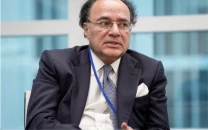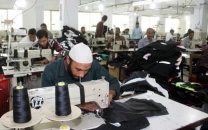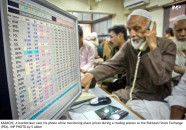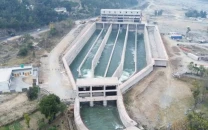The contributions of our workers abroad
Remittances have now become a backbone for the Pakistani economy.

In 2009, Pakistan was ranked 12th in the world in terms of overseas remittance inflows according to World Bank data, but has now risen to 7th position as of 2012. PHOTO: FILE
In the recent past, remittances have become an important source of foreign exchange inflows into developing countries. Half of the top ten recipients of remittances in the world are in Asia, including India, China, Philippines, Bangladesh and Pakistan. Remittance flows to developing countries were $235 billion in 2006, and increased with a growth rate of 22.9% to $289 billion by 2007. They further increased to $338 billion in 2008, with a growth rate of 16.9%.

Remittances are the second major source of foreign exchange earnings after exports in Pakistan. In 2009, Pakistan was ranked 12th in the world in terms of overseas remittance inflows according to World Bank data, but has now risen to 7th position as of 2012.
If we look at remittances during the last ten years post 9/11, inflows grew by each year except in 2004. In 2002, remittances were recorded at $2.3 billion; more than double of the $1 billion repatriated in 2000. In 2004, overseas Pakistanis sent only $3.8 billion, as against $4.2 billion in 2003, depicting a decline of 8.7%. When the democratic government took over, remittances accounted for $6.5 billion of net inflows in 2008. In fiscal 2012, remittances reached a record level of more than $13 billion.
The global economic downturn did not affect remittance inflows to Pakistan. This is so because the traditional migrant labour destinations in the Middle East, except the United Arab Emirates, remained largely insulated from the crisis. According to the Pakistan Economic Survey 2011-2012, workers’ remittances grew $1.83 billion in fiscal 2012 over the preceding year. In 2012, workers’ remittances to Pakistan of around $13.5 billion accounted for almost 75% of net current transfers. It can also be observed from Pakistan’s economic history that remittances have remained stable and countercyclical. Workers send more money to help their families during crises or natural disasters.
Remittances have become a backbone for sustainable growth of the Pakistani economy. More than seven million Pakistanis have been placed abroad since 1971, out of which approximately 96% of the total is concentrated in six countries in the Middle East – namely Saudi Arabia, the United Arab Emirates, Oman, Kuwait, Bahrain and Qatar. About 90% of the total are located in Saudi Arabia, the United Arab Emirates and Oman alone.
Money sent home by overseas Pakistanis amounted to $1.3 billion in February 2013, while remittances reached $9.3 billion in the first eight months of current fiscal year, with a growth rate of 7.5% over the same period last year. Monthly average remittances clocked in at $1.2 billion for the period, as compared to $1.1 billion during the same period of last fiscal year.
Saudi Arabia continues to be the biggest source of remittances, accounting for nearly 29% of the total during the eight months of the current fiscal year. UAE is the second major source of remittances to Pakistan, with 20% of the share. Other major sources of remittances are the USA, the UK and the European Union countries.
The money sent by migrant labour directly augments the income of the migrant’s household. The benefits that households derive from remittances depend on how and where they spend remittances: most are now spending less money on consumption goods and more on investment goods like education, housing, cars and other luxuries.
The writer is a researcher at the Economic Growth Unit of the Sustainable Development Policy Institute
Published in The Express Tribune, April 15th, 2013.
Like Business on Facebook to stay informed and join in the conversation.



















COMMENTS
Comments are moderated and generally will be posted if they are on-topic and not abusive.
For more information, please see our Comments FAQ